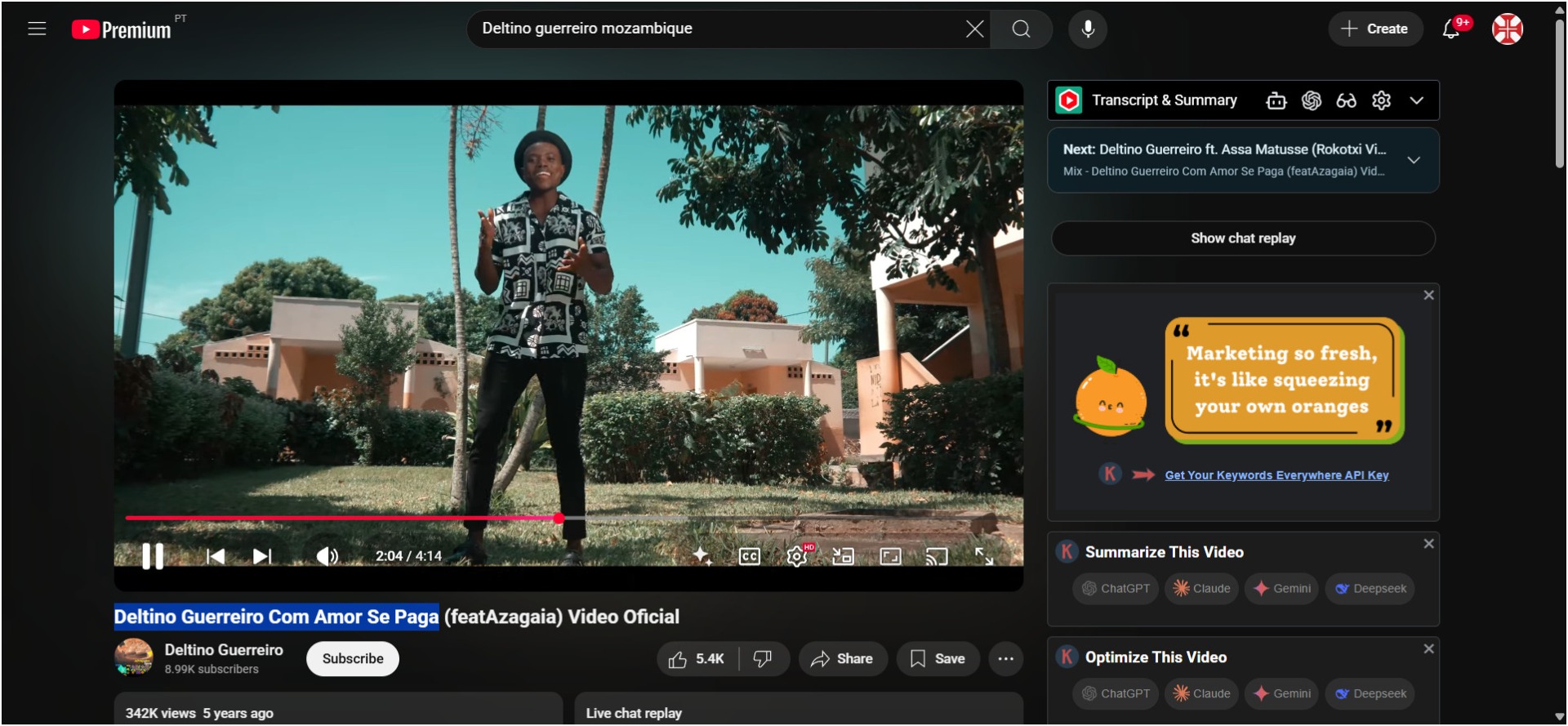mozambique music
Deltino Guerreiro: Mozambique's Soulful Storyteller
In the rich landscape of Mozambican music, Deltino Guerreiro stands out as a unique voice, weaving soul, R&B, and the traditional sounds of northern Mozambique into a captivating blend. Born Deltino Jaime Albino Guerreiro on August 26, 1990, in Montepuez, Cabo Delgado, this musician and economist has carved a niche in a musical landscape often dominated by southern rhythms. With his conscious lyrics in Portuguese, English, and Emakhuwa, and melodies that echo the Arabic influences of his homeland, Guerreiro's music is a testament to his journey from the rural north to the bustling capital, Maputo. His story is one of resilience, cultural pride, and a relentless pursuit of artistic excellence.
Roots and Rhythms: The Making of a Musician
Deltino Guerreiro's musical journey began in the small town of Montepuez, where he was raised by his grandparents. According to family accounts, his first steps as a toddler were taken to the rhythm of music, a fitting prelude to his career. Growing up, he helped on his family's machamba (farm) during weekends, grounding him in the rural traditions of northern Mozambique. These early years instilled a deep connection to his cultural roots, which would later define his sound.
In 2002, at the age of 12, Deltino began exploring music more formally, singing in hip-hop and R&B groups like P.Record and B Star. His passion deepened at 20 when he enrolled in a music course at the House of Culture in Nampula, where he learned to play the guitar. A year later, he moved to Maputo to pursue a degree in economics while chasing his musical dreams. His big break came in 2011 when he won the talent competition "Super Tardes" on Mozambican television (STV), a victory that marked his entry into the national spotlight. By 2015, he was named "Artista Revelação Masculina" (Best Male Revelation) at the Ngoma Moçambique Awards and nominated as one of the best artists of the year by Magazine, alongside literary icon Paulina Chiziane.
A Sound Like No Other
Deltino Guerreiro's music is a melting pot of influences, shaped by his travels from Mozambique's northern to southern regions. His sound fuses soul and R&B with the musical traditions of northern Mozambique, particularly the Arabic-influenced melodies that set him apart from the southern-dominated Mozambican music scene. Singing in Portuguese, English, and Emakhuwa (also known as Macua), his lyrics are introspective and socially conscious, addressing themes like ambition, struggle, and cultural identity.
His debut album, Eparaka (meaning "Blessed" or "Blessing" in Emakhuwa), released in the UK on April 8, 2016, introduced his unique sound to a broader audience. Tracks like "Sonho," a collaboration with British singer Joss Stone, captured the universal dream of striving for a better life, with lyrics reflecting economic hardships and aspirations: "Quem me dera ganhar um pouco mais, viajar pro Brasil / Sambar bué, surfar bué, conhecer o Rio enfim" ("I wish I could earn a bit more, travel to Brazil / Dance a lot, surf a lot, see Rio at last"). The song's raw honesty and soulful delivery resonated widely, earning critical acclaim. Other standout tracks from Eparaka include "3 Estações," released on February 6, 2016, and "Se Eu Te Dissesse," showcasing his ability to blend genres seamlessly.
Guerreiro's versatility shines through in later works like "Minha Joana" (2022) and "Vou Te Esperar" (2024), as well as collaborations such as "Rokotxi" with Assa Matusse. His performances, often accompanied by a live band, have graced major stages, including Mozambique's prestigious Festival Azgo and a workshop in Zimbabwe. In 2016 and 2023, he won the Ngoma Moçambique Best Male Voice Award, and in 2024, he claimed victory at the first Mozambican Music Hackathon, cementing his status as a leading figure in the industry.
A Multifaceted Talent
Beyond music, Deltino Guerreiro is a trained economist and the founder of Eparaka Serviços, a business venture reflecting his entrepreneurial spirit. His LinkedIn profile highlights his role as a freelance musician and composer, with a network of 178 connections, underscoring his professional versatility. As a songwriter, topliner, and producer, he brings a meticulous approach to his craft, blending percussion, piano, and guitar to create his signature sound.
Guerreiro's music also carries a cultural weight, preserving and promoting the traditions of northern Mozambique. His use of Emakhuwa alongside Portuguese and English bridges linguistic divides, making his work accessible yet deeply rooted in his heritage. Critics have compared his melodies to those of Mali, Gambia, and Burkina Faso, noting the Arabic influences that give his music a distinctive, almost hypnotic quality.
Challenges and Triumphs
Despite his talent, Deltino Guerreiro has faced challenges in gaining the widespread recognition he deserves. Mozambique's music industry, heavily centered in the south, often overshadows northern artists. Yet, Guerreiro's persistence has paid off. His live performances, a rarity in a scene increasingly reliant on pre-recorded tracks, showcase his authenticity and skill. His collaboration with Joss Stone on "Sonho," performed live at venues like 16Neto in Maputo, introduced him to international audiences, while his appearances on platforms like Spotify (with 2.2K monthly listeners) and SoundCloud have expanded his reach to cities like Lisbon, Porto, Paris, and Amsterdam.
Why Deltino Guerreiro Matters
Deltino Guerreiro is more than a musician; he's a cultural ambassador for northern Mozambique, a region often underrepresented in the country's artistic narrative. His music tells the story of a man who has navigated rural roots, urban ambition, and global influences, all while staying true to his identity. For fans of soul, R&B, and African music, Guerreiro's discography—available on platforms like Spotify, Apple Music, and YouTube—offers a rich exploration of sound and sentiment. Tracks like "Sonho," "3 Estações," and "Freedom" are not just songs but invitations to experience Mozambique through his eyes.
As he continues to create, perform, and inspire, Deltino Guerreiro remains a warrior—true to his surname—in the fight for artistic expression and cultural representation. His journey reminds us that music can transcend borders, languages, and genres, uniting listeners in the universal language of the soul.
